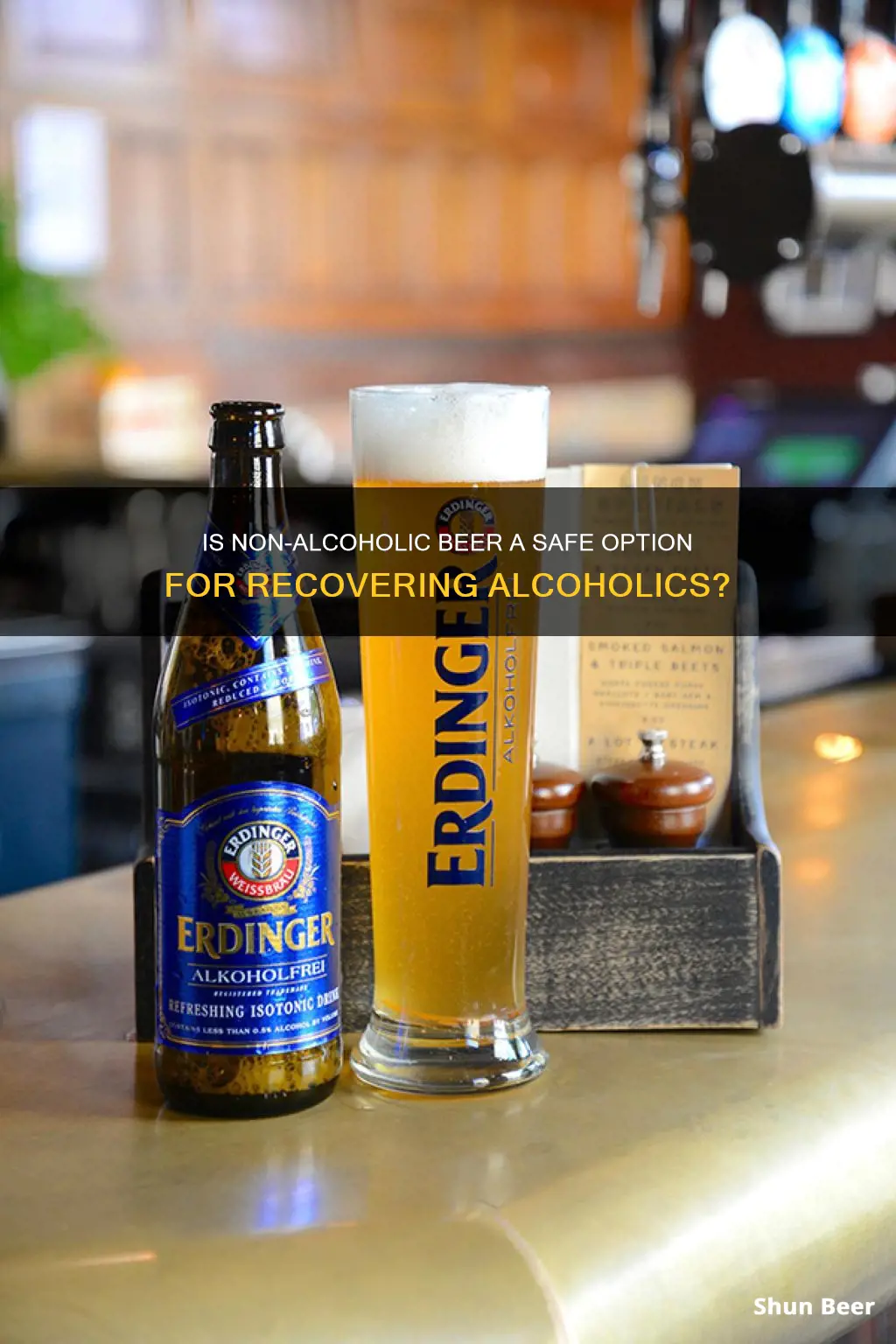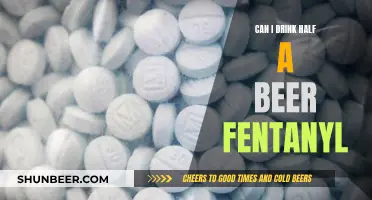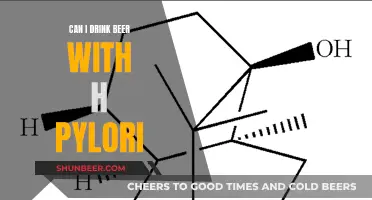
Non-alcoholic beer has gained popularity in recent years as a viable alternative for those in recovery from alcohol addiction. However, the question of whether consuming non-alcoholic beer is considered breaking sobriety remains a subject of debate. While non-alcoholic beer can provide a sense of normalcy and inclusivity for individuals in recovery, allowing them to participate in social gatherings without feeling left out, it is important to consider the potential risks associated with it. In this paragraph, we will explore the topic of whether recovering alcoholics should drink non-alcoholic beer, weighing the benefits against the potential triggers and dangers it may pose for those in recovery.
| Characteristics | Values |
|---|---|
| Alcohol content | Non-alcoholic beer usually contains 0.5% alcohol by volume (ABV) or less. However, some non-alcoholic beers may contain trace amounts of alcohol, and a few exceed the 0.5% ABV limit. |
| Taste and appearance | Non-alcoholic beer is designed to taste, look, and smell like traditional beer. |
| Benefits | Non-alcoholic beer provides an option for those who want to enjoy the taste of beer without the intoxicating effects. It can help recovering alcoholics navigate social situations where alcohol is present and feel included without compromising their sobriety. |
| Risks | Non-alcoholic beer can trigger cravings and memories of past drinking experiences, leading to a potential relapse. The sensory experience of drinking non-alcoholic beer may stimulate the reward centres of the brain and release dopamine. |
| Recommendations | Opinions vary, and the decision to drink non-alcoholic beer during recovery depends on individual circumstances. It is crucial to assess triggers and consult with healthcare professionals or support groups to determine if non-alcoholic beer is suitable. |
What You'll Learn

Non-alcoholic beer may trigger cravings and cause relapse
Non-alcoholic beer may be triggering for recovering alcoholics and cause a relapse. While non-alcoholic drinks provide an option for those in recovery who want to enjoy the taste and social experience of drinking beer without the intoxicating effects, the sensory experience of drinking non-alcoholic beer may be a powerful trigger for some people in recovery. The smell, taste, and appearance of non-alcoholic beer can evoke euphoric recall, a form of selective memory where the recovering addict glamorizes their drinking history while ignoring the negative consequences. This can lead to cravings and a potential relapse.
The risk of relapse is further heightened by the fact that non-alcoholic beer still contains trace amounts of alcohol. In the United States, beverages with up to 0.5% alcohol by volume (ABV) can be labelled as non-alcoholic. While this amount is unlikely to cause intoxication, it can pave the way for rationalizing the consumption of stronger drinks. Additionally, studies have shown that some non-alcoholic beers exceed the 0.5% ABV limit, with a few reaching up to 1.8% ABV. Consuming excessive amounts of these mislabelled drinks could potentially lead to a buzz, creating a dangerous situation for a recovering alcoholic.
The act of drinking non-alcoholic beer can also serve as a behavioural crutch. Recovering alcoholics should focus on creating new habits, meeting new people, and engaging in new activities that do not revolve around drinking. Drinking non-alcoholic beer in the same social settings with the same friends can trigger urges and cravings, increasing the risk of relapse. It is crucial for recovering alcoholics to establish a new lifestyle that does not include the behavioural crutches associated with their drinking habit.
Furthermore, the very concept of "near beer" or artificial spirits can be psychologically dangerous for some recovering alcoholics. The taste and appearance of non-alcoholic beer are designed to mimic real beer, and this similarity can be a trigger for those who miss the act of drinking. It can lead to a slippery slope where individuals progress from drinking non-alcoholic beer to excessively consuming the real thing. The familiarity and ritual associated with drinking can be as addictive as the alcohol itself, and non-alcoholic beer may not provide a sufficient break from these rituals.
In conclusion, while non-alcoholic beer can provide a sense of normalcy and inclusivity for some recovering alcoholics, it is essential to recognize the potential risks involved. The decision to consume non-alcoholic beer during recovery should be made with careful consideration of individual triggers and the potential for relapse.
Beer Taxes: Effective or Just a Burden?
You may want to see also

It can stimulate the reward centres of the brain
The smell, taste, and appearance of non-alcoholic beer can stimulate the reward centres of the brain, triggering the release of dopamine. The act of cracking open a can, inhaling the malty notes of a lager, or feeling the cold weight of a condensation-beaded glass can activate the reward centres of the brain, leading to a release of dopamine. This can be a powerful trigger for recovering alcoholics, stimulating cravings and creating a sense of euphoric recall.
The sensory experience of non-alcoholic beer can evoke memories of past drinking experiences, causing individuals to romanticise their previous drinking habits and forget the negative consequences. This phenomenon, known as "euphoric recall", can weaken their commitment to sobriety and increase the risk of relapse. The taste and smell of non-alcoholic beer may trigger a relapse, as it closely resembles traditional beer, stimulating the reward centres of the brain and evoking memories of drinking.
The placebo effect also comes into play, where the act of consuming a beverage resembling beer can trigger sensations and emotions similar to those associated with alcohol consumption. This can have both positive and negative effects, depending on the individual's mindset and intentions. For some, it may provide a sense of relaxation and help take the edge off, while for others, it may trigger cravings and reminders of past drinking experiences.
While non-alcoholic beer contains minimal or no alcohol, it is important to recognise that it can still activate the reward pathways in the brain. The ritual of drinking, the sensory stimuli, and the psychological associations can stimulate the release of dopamine, triggering cravings and potentially leading to a relapse. Therefore, it is crucial for recovering alcoholics to carefully consider their own triggers and make informed decisions about consuming non-alcoholic beer during their recovery journey.
Beer Butt Chicken: Does It Work?
You may want to see also

It can trigger euphoric recall
Euphoric recall is a common challenge for friends, family members, and loved ones of those addicted to alcohol. It is the psycho-physical experience of remembering the "good old days", or the good times of drinking. An alcoholic experiencing euphoric recall will glorify and exaggerate pleasurable memories of drinking, while blocking out or repressing the negative memories and pain.
An anonymous blog on the Alcoholics Guide to Alcoholism describes euphoric recall:
> "The thing is, when I thought of a drink, it wasn’t of the last time I drank. I didn’t think of the violent shakes, the vomiting, the DTs, hallucinations. No, I thought of sunny lit bars with sexy barmaids, and people drinking, laughing, and having fun. Music playing, people dancing etc... It had been some years since this had been my drinking experience, but this facsimile in my head, of what a drink looked and felt like, would play like a film across my mind."
This phenomenon can be extremely dangerous for recovering alcoholics as it can lead to relapse. The positive associations with drinking can trigger cravings and make it difficult for individuals to maintain their sobriety. The National Institute on Alcohol Abuse and Alcoholism refers to these as "urges" and "cravings", which can tempt recovering alcoholics to drink.
Helen Keane, in her book What's Wrong with Addiction?, explains that euphoric recall:
> "convinces addicts that they remember a drinking or using episode perfectly. But rather than remembering how they behaved—talking incoherently, stumbling, becoming aggressive—they remember how they felt: brilliant, witty, and sexy."
The Substance Abuse and Mental Health Services Administration further emphasises the danger of euphoric recall, stating:
> "Euphoric recall is a potential relapse risk factor because it minimizes clients’ perceptions of stimulants’ danger, promoting an ambivalence about quitting."
Therefore, it is important for recovering alcoholics to be aware of the potential risks of non-alcoholic beer triggering euphoric recall and cravings, and to make an informed decision about whether to consume such beverages.
Old Beer: Is It Safe to Drink After Four Years?
You may want to see also

It may lead to a slippery slope
The idea of a "slippery slope" is a common concern when it comes to recovering alcoholics drinking non-alcoholic beer. This concept suggests that even a small step towards drinking, such as consuming a non-alcoholic beverage, can lead to a gradual slide back into alcohol consumption and potentially full-blown addiction. The taste, smell, and sensory experience of non-alcoholic beer may trigger powerful cravings and set the stage for a relapse.
For some recovering alcoholics, the very act of drinking a non-alcoholic beer, with its familiar rituals and sensations, can activate reward centres in the brain and release dopamine. This can lead to a craving for the "real deal", resulting in a return to drinking full-alcohol products. The taste and smell of non-alcoholic beer, which can be almost indistinguishable from regular beer, may evoke positive memories of drinking and trigger "euphoric recall". Euphoric recall is a form of selective memory where the recovering alcoholic romanticises their past drinking experiences, forgetting the negative consequences and the havoc it wreaked on their life. This can weaken their commitment to sobriety and lead to thoughts of drinking in moderation.
The availability of non-alcoholic beer may also provide a behavioural crutch, hindering the development of new habits, friendships, and behaviours that do not revolve around drinking. Instead of creating a safe distance from old drinking habits, non-alcoholic beer allows recovering alcoholics to remain in familiar environments and maintain old rituals, which can be risky. It can be a reminder of the "'good times' of drinking" and make it challenging to acknowledge the negative consequences of active addiction.
Additionally, the very presence of non-alcoholic beer may indicate a lack of dedication to recovery. The desire to consume it may suggest that the individual is not fully committed to leaving their addiction behind and has not adequately addressed the underlying reasons for their substance abuse.
The potential risks of non-alcoholic beer are significant enough that many recovery coaches and organisations advise against its consumption. They view it as a slippery slope that could lead to a devastating relapse. However, it is important to recognise that each person's recovery journey is unique, and individual circumstances and triggers must be considered when making decisions about non-alcoholic beer consumption.
Dented Beer Can Drinking: Safe or Not?
You may want to see also

It can be a powerful trigger
Non-alcoholic beer can be a powerful trigger for recovering alcoholics. While it may seem like an appealing option, it carries several risks that individuals in recovery should be aware of.
Firstly, it is important to note that non-alcoholic beer is not completely alcohol-free. Most non-alcoholic beers contain trace amounts of alcohol, typically around 0.5% alcohol by volume (ABV), which is the legal limit for a drink to be considered non-alcoholic. While this amount is unlikely to cause intoxication, it can pave the way for rationalizing the consumption of stronger drinks. Additionally, studies have shown that some non-alcoholic beers may contain higher levels of alcohol than declared on their labels, with up to 30% of beverages tested containing ethanol levels higher than advertised.
The look, smell, and taste of non-alcoholic beer can be a significant trigger for recovering alcoholics. The sensory experiences associated with drinking beer, even without the intoxicating effects, can cause frustration and trigger a condition known as euphoric recall. Euphoric recall is a form of selective memory where a recovering addict glamorizes their active addiction while ignoring the negative consequences it had on their life. The similar appearance, aroma, and flavour of non-alcoholic beer to its alcoholic counterpart can stimulate the reward centres of the brain, releasing dopamine and triggering cravings for the real deal.
Consuming non-alcoholic beer can also serve as a behavioural crutch for recovering alcoholics. Recovery from alcohol addiction involves creating new habits, meeting new friends, exploring new places, and engaging in new activities. Drinking non-alcoholic beer can become a crutch that hinders progress and keeps individuals tied to their old drinking habits and environments. It can trigger urges and cravings that may be too powerful to resist, leading to a relapse.
The desire to consume non-alcoholic beer may also indicate a lack of dedication to recovery and an unwillingness to leave the negativity of addiction behind. It may suggest that the individual has not fully addressed the underlying reasons for their substance abuse problem and may need additional support and structure in their recovery journey.
While non-alcoholic beer can provide a sense of inclusion and normalcy in social situations, it is crucial for recovering alcoholics to assess their own triggers and make informed decisions. The risks associated with non-alcoholic beer may outweigh the benefits for some individuals, and it is essential to prioritize sobriety and long-term recovery.
Tooth Extraction and Beer: What You Need to Know
You may want to see also
Frequently asked questions
Non-alcoholic beer, or NA beer, is a beverage that is designed to taste, look, and smell like traditional beer but contains very minimal or no alcohol. In many countries, to be considered non-alcoholic, a beer must contain 0.5% or less alcohol by volume (ABV).
Non-alcoholic beer can help recovering alcoholics feel included in social situations where alcohol is being consumed, without compromising their sobriety. It can also help them feel like they are not missing out on the taste and experience of drinking alcohol.
Non-alcoholic beer can trigger cravings and act as a slippery slope that leads to a relapse. The taste, smell, and appearance of non-alcoholic beer can trigger euphoric recall, where recovering alcoholics selectively remember the good times of drinking and forget the negative consequences.
Water, soda, juice, and mocktails are some non-alcoholic alternatives.
It is important to be aware of your triggers and avoid high-risk situations. Take note of any internal or external triggers you experience when consuming non-alcoholic beer and talk to your therapist or sponsor about them. It may also be helpful to practice your response to triggers in advance.







